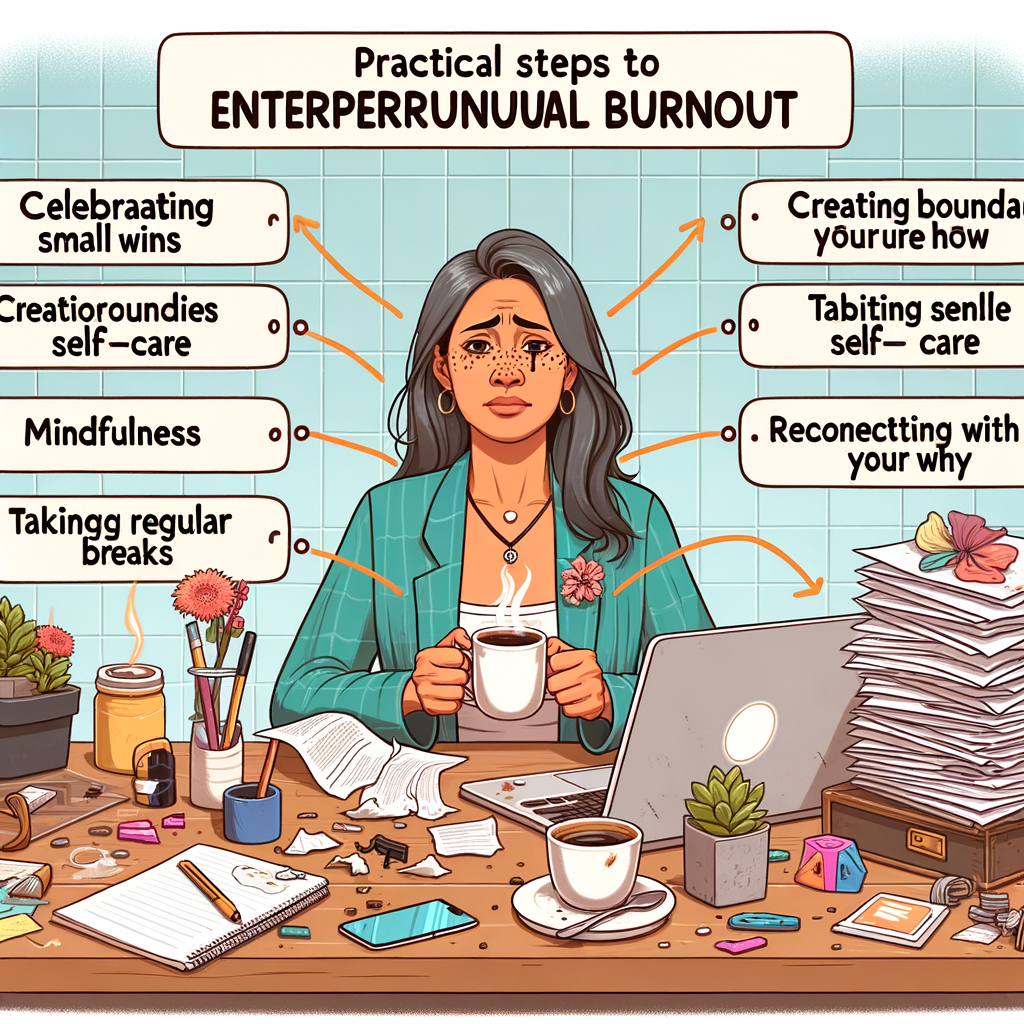Entrepreneurial burnout is a state of physical, emotional, and mental exhaustion caused by prolonged and intense stress associated with running a business. It can lead to decreased productivity, loss of passion, and even health problems. Overcoming entrepreneurial burnout is crucial for both personal well-being and business success. This introduction aims to provide practical tips for entrepreneurs to renew their energy, regain their passion, and continue their journey with resilience and vigor. By implementing strategies for self-care, time management, delegation, and seeking support, entrepreneurs can navigate the challenges of burnout and emerge stronger. These practical tips are designed to help entrepreneurs create a sustainable work-life balance, foster a positive mindset, and rekindle their entrepreneurial spirit.
Strategies for Managing Stress and Preventing Burnout in Entrepreneurship
Entrepreneurial burnout is a state of physical, emotional, and mental exhaustion caused by prolonged stress and overwork. It’s a common challenge faced by entrepreneurs who are deeply passionate about their ventures but often neglect their well-being in the pursuit of success. Overcoming entrepreneurial burnout requires a strategic approach that not only addresses the symptoms but also tackles the root causes. This article provides practical tips for entrepreneurs seeking to rejuvenate their energy and prevent burnout.
Firstly, recognizing the signs of burnout is crucial. Symptoms include chronic fatigue, irritability, insomnia, anxiety, and a noticeable decrease in productivity. Acknowledging these signs early can prevent a full-blown burnout. Once identified, the next step involves reassessing your workload. Entrepreneurs often take on more than they can handle, driven by a desire to excel. However, delegating tasks and setting realistic goals can significantly reduce stress levels. It’s essential to understand that delegating does not mean losing control over your business; rather, it’s about empowering others and optimizing productivity.
Moreover, establishing a work-life balance is paramount. Entrepreneurs are known for blurring the lines between personal and professional life, which can lead to burnout. Setting clear boundaries, such as designated work hours and unplugged family time, can help maintain this balance. It’s also beneficial to cultivate hobbies outside of work, as they can serve as a great outlet for stress.
Another effective strategy is to prioritize self-care. This encompasses a range of practices from getting adequate sleep and maintaining a healthy diet to engaging in regular physical activity. Exercise, in particular, is a powerful stress reliever that can boost your mood and energy levels. Additionally, mindfulness practices such as meditation and deep breathing exercises can enhance mental well-being and focus.
Networking with fellow entrepreneurs can also provide support and alleviate feelings of isolation, which often accompany burnout. Sharing experiences and coping strategies can offer new perspectives and encourage a sense of community. Furthermore, seeking professional help, such as counseling or coaching, can be invaluable. These professionals can provide personalized strategies to manage stress and improve overall well-being.
Lastly, it’s important to periodically review and adjust your approach to work. This involves setting aside time for reflection and reassessment of your goals, strategies, and personal well-being. It’s an opportunity to celebrate achievements, learn from setbacks, and realign your actions with your values and objectives.
In conclusion, overcoming entrepreneurial burnout is a multifaceted process that requires a proactive and mindful approach. By recognizing the signs early, reassessing workload, establishing a work-life balance, prioritizing self-care, networking, seeking professional help, and regularly reviewing your approach to work, entrepreneurs can not only recover from burnout but also prevent its recurrence. Implementing these practical tips can lead to renewed energy, enhanced productivity, and a more fulfilling entrepreneurial journey. Remember, the success of your business is intrinsically linked to your well-being; therefore, taking care of yourself is not just beneficial but essential for sustainable success.
The Role of Mindfulness and Self-Care in Combating Entrepreneurial Burnout
 Entrepreneurial burnout is a state of physical, emotional, and mental exhaustion caused by prolonged stress and overwork. It’s a common challenge faced by entrepreneurs who, driven by passion and the pressure to succeed, often push themselves beyond their limits. However, it’s crucial to address this issue head-on, as unchecked burnout can lead to serious health problems and hinder the success of your business. Fortunately, mindfulness and self-care are powerful tools that can help entrepreneurs overcome burnout and regain their energy and focus.
Entrepreneurial burnout is a state of physical, emotional, and mental exhaustion caused by prolonged stress and overwork. It’s a common challenge faced by entrepreneurs who, driven by passion and the pressure to succeed, often push themselves beyond their limits. However, it’s crucial to address this issue head-on, as unchecked burnout can lead to serious health problems and hinder the success of your business. Fortunately, mindfulness and self-care are powerful tools that can help entrepreneurs overcome burnout and regain their energy and focus.
Mindfulness, the practice of being present and fully engaged in the current moment without judgment, has been shown to significantly reduce stress and improve mental clarity. For entrepreneurs, incorporating mindfulness into their daily routine can be a game-changer. It starts with simple practices such as mindful breathing or meditation for a few minutes each day. These practices help in cultivating an awareness of one’s thoughts and feelings without getting overwhelmed by them. This heightened awareness can lead to better decision-making, increased creativity, and a more balanced approach to handling the pressures of entrepreneurship.
Moreover, mindfulness encourages entrepreneurs to adopt a more compassionate and forgiving attitude towards themselves. It’s easy to fall into the trap of self-criticism when things don’t go as planned. However, by practicing mindfulness, entrepreneurs can learn to treat themselves with the same kindness and understanding they would offer a friend, which is essential for overcoming burnout.
Transitioning from mindfulness to self-care, it’s important to recognize that taking care of one’s physical and emotional well-being is not a luxury but a necessity for sustained entrepreneurial success. Self-care encompasses a wide range of activities that nourish the body and soul, from ensuring adequate sleep and nutrition to engaging in regular physical exercise and pursuing hobbies or interests outside of work. These activities can significantly boost energy levels, improve mood, and enhance overall well-being, making it easier to tackle the challenges of entrepreneurship with renewed vigor.
One practical tip for integrating self-care into a busy entrepreneurial schedule is to set clear boundaries between work and personal time. This might mean designating specific times of the day for work and strictly adhering to them, or taking regular, scheduled breaks throughout the day to disconnect and recharge. It’s also beneficial to cultivate a supportive network of friends, family, and fellow entrepreneurs who understand the unique challenges of entrepreneurship and can offer encouragement and advice when the going gets tough.
In conclusion, overcoming entrepreneurial burnout requires a holistic approach that includes both mindfulness and self-care. By practicing mindfulness, entrepreneurs can develop the mental resilience needed to navigate the ups and downs of business ownership. At the same time, by prioritizing self-care, they ensure that they have the physical and emotional strength to pursue their goals. Together, these strategies can help entrepreneurs not only recover from burnout but also build a more sustainable and fulfilling career. Remember, the journey of entrepreneurship is a marathon, not a sprint, and taking care of your well-being is key to reaching the finish line.
Time Management Techniques for Entrepreneurs to Achieve Work-Life Balance
Entrepreneurial burnout is a state of physical, emotional, and mental exhaustion caused by prolonged stress or frustration, particularly common among entrepreneurs who are deeply invested in their businesses. It’s a significant hurdle that can impede the growth of both the entrepreneur and their venture. However, with the right strategies, overcoming this burnout and achieving a healthy work-life balance is entirely possible. This article delves into practical tips and time management techniques that entrepreneurs can employ to rejuvenate their energy and sustain their passion for their business.
The first step in combating entrepreneurial burnout is recognizing its signs, which often include persistent fatigue, irritability, lack of motivation, and a feeling of being overwhelmed by the demands of the business. Once identified, entrepreneurs can take proactive measures to address the root causes of their stress. One effective strategy is setting clear, achievable goals. By breaking down larger objectives into smaller, manageable tasks, entrepreneurs can alleviate the feeling of being overwhelmed and gain a sense of accomplishment as they tick off items from their to-do list.
Time management plays a crucial role in preventing burnout. Entrepreneurs are often guilty of trying to do everything themselves, leading to long hours and the blurring of lines between work and personal life. To avoid this, they must learn to delegate tasks effectively. Delegation not only lightens the workload but also empowers team members by entrusting them with responsibilities, fostering a sense of teamwork and shared purpose.
Moreover, establishing boundaries is essential for maintaining a healthy work-life balance. This means setting specific work hours and sticking to them, as well as learning to say no to requests that exceed those boundaries. It’s also important for entrepreneurs to schedule regular breaks throughout the day to rest and recharge. Even short breaks can significantly boost productivity and creativity, helping to maintain focus and prevent burnout.
Another key aspect of managing time effectively is prioritizing tasks based on their urgency and importance. This involves identifying tasks that require immediate attention and those that contribute to long-term goals. By focusing on high-priority tasks, entrepreneurs can ensure that their efforts are aligned with their business objectives, reducing the time spent on less impactful activities.
In addition to these strategies, entrepreneurs should not underestimate the importance of self-care. Regular physical activity, a healthy diet, and adequate sleep are foundational to maintaining energy levels and resilience in the face of stress. Furthermore, pursuing hobbies and interests outside of work can provide a much-needed escape from the pressures of entrepreneurship, offering a fresh perspective and renewed enthusiasm for the business.
Finally, seeking support from peers, mentors, or professional counselors can be incredibly beneficial. Sharing experiences and challenges with others who understand the entrepreneurial journey can provide valuable insights, encouragement, and coping strategies. Sometimes, simply knowing that one is not alone in facing these challenges can make a significant difference.
In conclusion, overcoming entrepreneurial burnout requires a multifaceted approach that includes setting achievable goals, effective time management, delegation, establishing boundaries, prioritizing tasks, self-care, and seeking support. By implementing these practical tips, entrepreneurs can regain their energy, passion, and focus, leading to a more balanced and fulfilling professional and personal life. Remember, the key to sustainable success is not just working harder, but working smarter and taking care of oneself along the way.
Building a Support Network: Key to Overcoming Burnout for Entrepreneurs
Entrepreneurial burnout is a state of physical, emotional, and mental exhaustion caused by prolonged stress or frustration, particularly common among entrepreneurs who are deeply invested in their businesses. It’s a critical issue that can undermine the very foundation of your business and personal life if not addressed properly. However, overcoming entrepreneurial burnout is possible with the right strategies, and one of the most effective approaches is building a robust support network. This network can provide the emotional, psychological, and sometimes logistical support needed to navigate through challenging times.
The first step in building a support network is to identify the types of support you need. Entrepreneurs often require a mix of professional and personal support. Professional support can come from mentors, industry peers, or a business coach who understands the unique challenges of running a business. These individuals can offer invaluable advice, share their experiences, and provide strategies that can help you manage stress and avoid common pitfalls. On the other hand, personal support typically comes from friends, family, or a support group who can offer a listening ear, understanding, and encouragement. They can help you maintain a healthy work-life balance, reminding you that there’s life outside of your business endeavors.
Once you’ve identified the types of support you need, the next step is to actively seek out these connections. Networking events, industry conferences, and online forums are excellent places to meet mentors and peers. Meanwhile, joining entrepreneur support groups or clubs can also provide a sense of community and belonging. These groups often consist of individuals who are going through similar experiences, making them an excellent source of empathy, advice, and motivation. Additionally, don’t underestimate the power of social media platforms for connecting with like-minded individuals and building your support network.
Maintaining your support network is just as important as building it. Regular check-ins, whether through meetings, calls, or even social media interactions, can help keep the connections strong. It’s also crucial to be open and honest about your struggles. Sharing your experiences can not only provide you with relief but also help others in your network who might be facing similar challenges. Remember, vulnerability can strengthen relationships and foster a deeper sense of community.
Moreover, leveraging your support network effectively involves giving back. Support networks thrive on reciprocity. Offering your own insights, experiences, and time to help others in your network can reinforce your relationships and ensure that support is available when you need it most. This mutual exchange of support and knowledge can create a strong foundation that benefits all members.
In conclusion, overcoming entrepreneurial burnout requires a multifaceted approach, and building a strong support network is a key component of this strategy. By identifying and actively seeking out both professional and personal support, maintaining these connections through regular engagement, and participating in the give-and-take of support, entrepreneurs can create a resilient foundation to help them navigate the challenges of business ownership. This network not only provides a buffer against burnout but also enriches the entrepreneurial journey, making it more sustainable and fulfilling in the long run.
Conclusion
To overcome entrepreneurial burnout, it’s essential to adopt a multifaceted approach that addresses both the root causes and the symptoms. Practical tips for renewed energy include setting clear boundaries between work and personal time to ensure adequate rest and recovery, delegating tasks to reduce workload, prioritizing tasks to focus on what truly matters, incorporating regular physical activity and healthy eating habits to boost physical and mental health, practicing mindfulness or meditation to manage stress, seeking support from mentors, peers, or professionals to share burdens and gain new perspectives, and taking time off or vacations to recharge fully. By implementing these strategies, entrepreneurs can regain their energy, enhance their well-being, and sustain their passion and productivity in their business endeavors.






